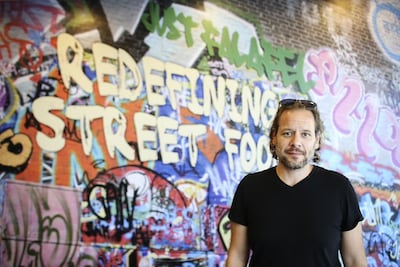A second food business connected to the daughter of NMC founder BR Shetty received money from the stricken hospital group before it collapsed under billions of dollars of debt, new documents seen by The National reveal.
NMC Healthcare, a subsidiary, signed off on five bank transfers totalling Dh4 million in little more than two months in 2016 to the UAE catering and food consultancy company, The Foodsters Inc, headed by businesswoman Reema Shetty.
The series of proposed payments, from Dh500,000 to Dh1m, approved by NMC raise concerns of potential wrongdoing because they were labelled as internal transfers within the hospital group, a forensic accountant told this newspaper.
The revelations pile pressure on the group's billionaire founder to explain money flows from the hospital group after The National revealed last week that NMC Healthcare had signed off on payments of Dh2m in 2015 to a separate food company headed by Ms Shetty's husband.
Mr Shetty was NMC's chief executive and executive vice chairman at the time of the five proposed payments from September to November 2016 that were approved by an unidentified authorised signatory.
Most of the payments were described as transfers within the NMC group even though The Foodsters was not listed as being a subsidiary of NMC Health in company documents.
Financial experts said the round payments were unusual if The Foodsters had been providing catering – and any transfers should not have been described as internal movements of money.
If the group does not own the food company “then it’s not an internal transfer”, said forensic accountant Roger Isaacs of Milsted Langdon in the UK.
“In the corporate world, it must either be one of three things – you are either buying goods or services, you are lending some money or you are repaying a debt,” he said.
He said the proposed payments sounded suspicious.
“If the shares are owned by the PLC [public limited company], it should still be listed in the PLC accounts.”
Mr Shetty, Ms Shetty and their representatives did not respond to repeated requests for comment.
The former London-listed NMC holding company was forced into administration in April amid claims of fraud, mismanagement and the discovery of undisclosed loans of $4.1 billion (Dh15bn).
Administrators Alvarez & Marsal said last month they were trawling hundreds of thousands of documents and preparing a series of interviews with directors to try to find out what could be retrieved for creditors.
The administrators declined to comment on whether they had yet spoken with Mr Shetty. He has blamed a small group of former and current executives and claimed they had signed off on “many fraudulent transfers” that he did not know about before the company went into administration.
He said he would work “tirelessly to clear my name” and that events since December 2019 had shocked him as much as anyone else.
“To see everything that my family and I have strived to build over the past 45 years eroded over the course of a few short months, and mainly due to the misconduct and wrongdoing of people I put so much trust in, saddens me beyond words,” he said in April. “It has also left my entire family in a perilous financial position.”
The proposed payments are detailed in transfer request documents sent by NMC Healthcare to the Abu Dhabi branch of the Bank of Baroda.
They identified the beneficiary as “The Foodsters Investment in Commercial Enterprises” with an account with Mashreq Bank in Abu Dhabi. The company is listed in a UAE business directory with a link to the website of The Foodsters Inc.
The National has also viewed an internal bank document that confirmed one payment for Dh1m had been processed by Bank of Baroda. Financial experts who viewed the documents on behalf of The National said they appeared to be genuine.
The Foodsters Inc was set up in 2015 by Ms Shetty and her husband Mohamad Bitar after the failure of a global expansion of fast-food business Just Falafel, which they founded about a decade earlier.
Ms Shetty is chief executive of The Foodsters, which supplies food lorries selling burgers and fried chicken to events in the UAE. It also provides event catering and consultancy.
“As [chief executive] of the Foodsters, one of her main objectives is to ensure the company supports as many families as possible through employment while maintaining an efficient operating structure,” reads a description of Ms Shetty on one of the company’s websites.
“She brings [a] few important lessons to the table ... Establish a solid foundation, maintain a family environment, love what you do, research and innovate, be ethical, give back, dream.”
The first payment request for Dh1m in September 2016 was made a day after The Foodsters announced the launch of a new season of food events on its Instagram channel.
Over the next two months when the payments were made, the company attended events such as the Abu Dhabi Grand Prix and a technology show at the Dubai World Trade Centre. It also launched a new fried chicken brand.
Its last post on Instagram and Facebook was in November 2019, in which it promoted its food products at the Formula One Abu Dhabi Grand Prix.
One month later, an activist investor raised concerns of activity at NMC Health that bore all the “hallmarks of significant fraud”, sparking the group’s eventual demise.
The collapse of the former FTSE-100-listed company has sparked calls for a British parliamentary inquiry.
“Events at NMC Health represent the most serious governance failure at a UK-listed company in recent years,” said Tom Powdrill, head of stewardship at the London corporate consultancy Pirc.
“It is still unclear how the company’s true financial position remained hidden; therefore, there should be a formal response to these disclosures. The NMC case is an embarrassment to the UK’s corporate governance regime.”










